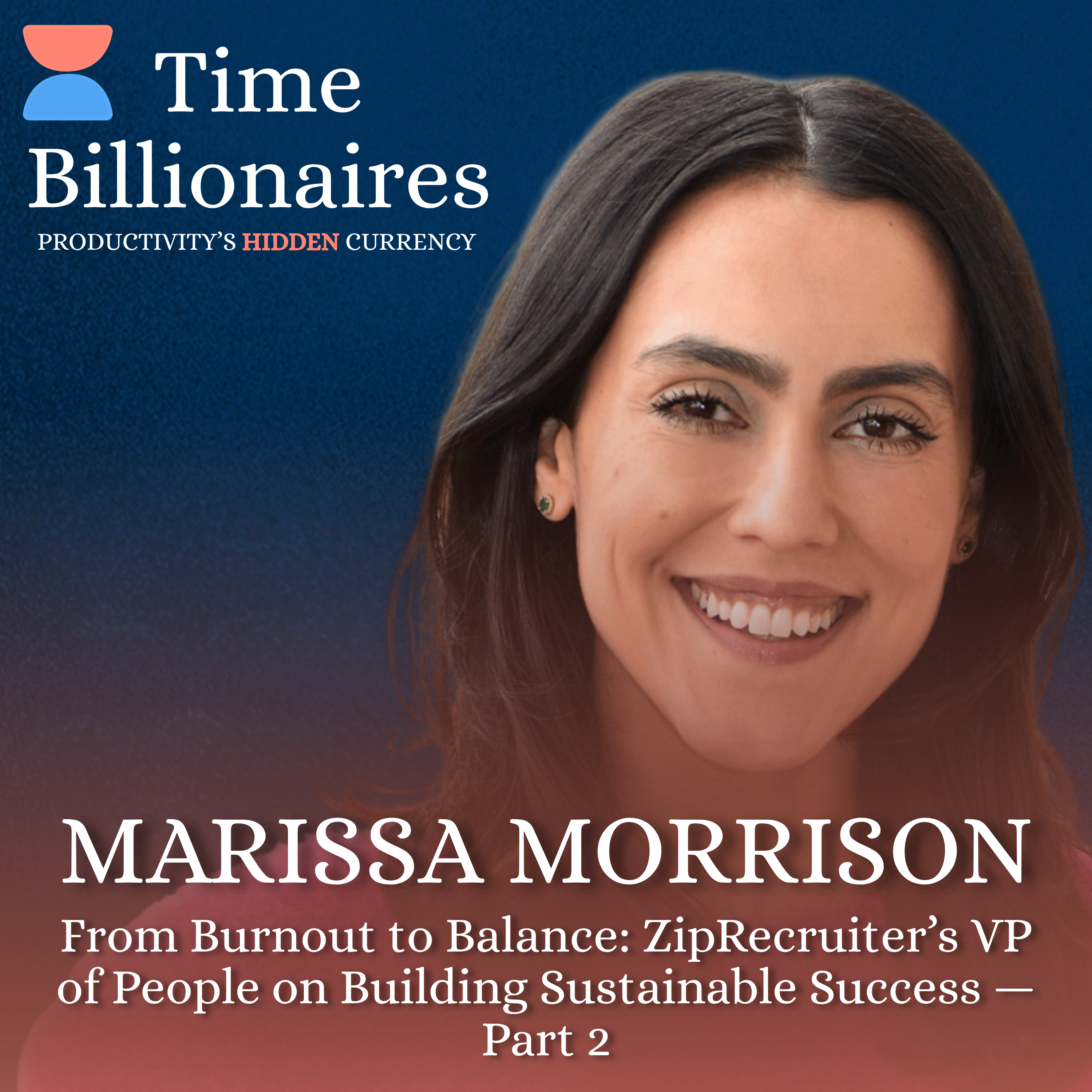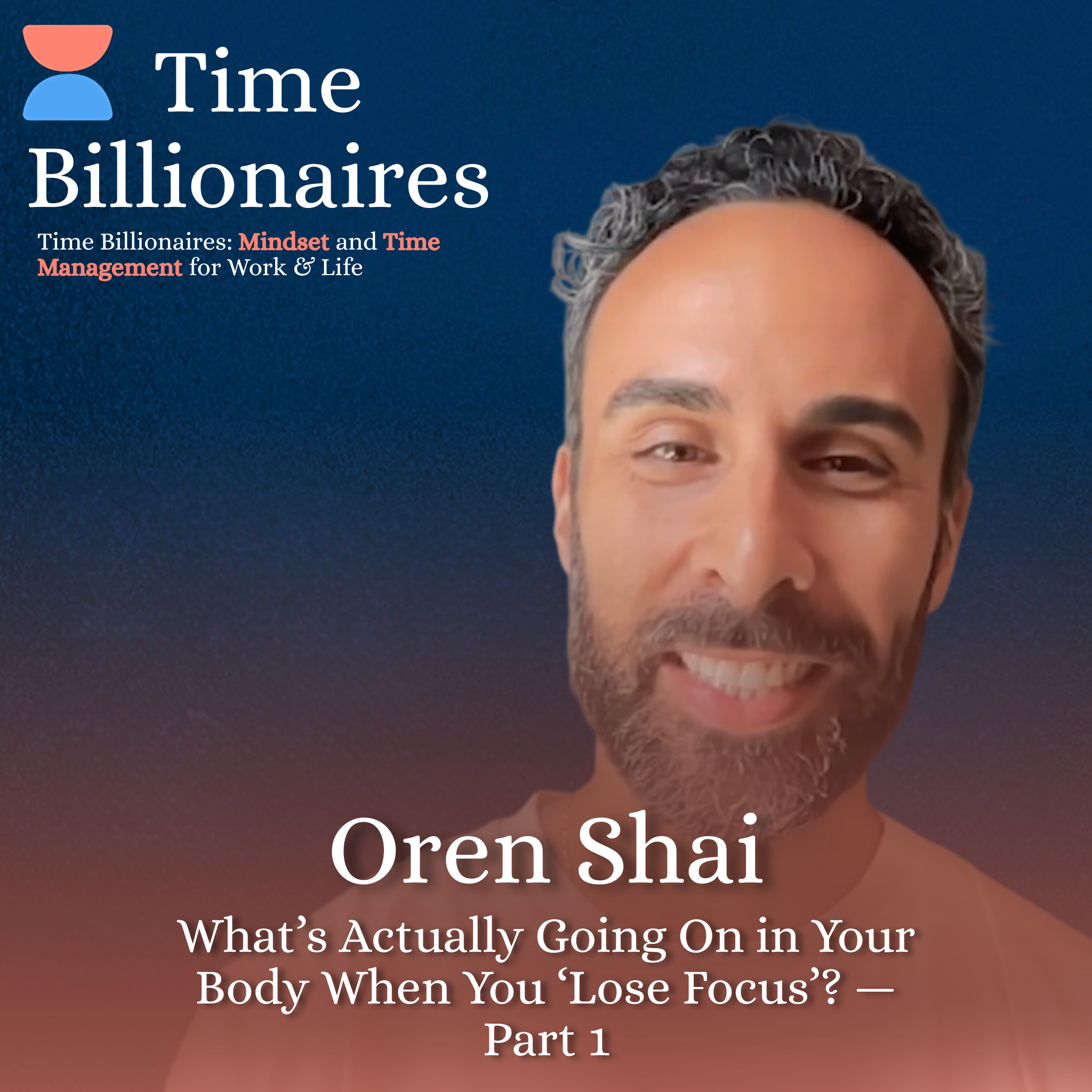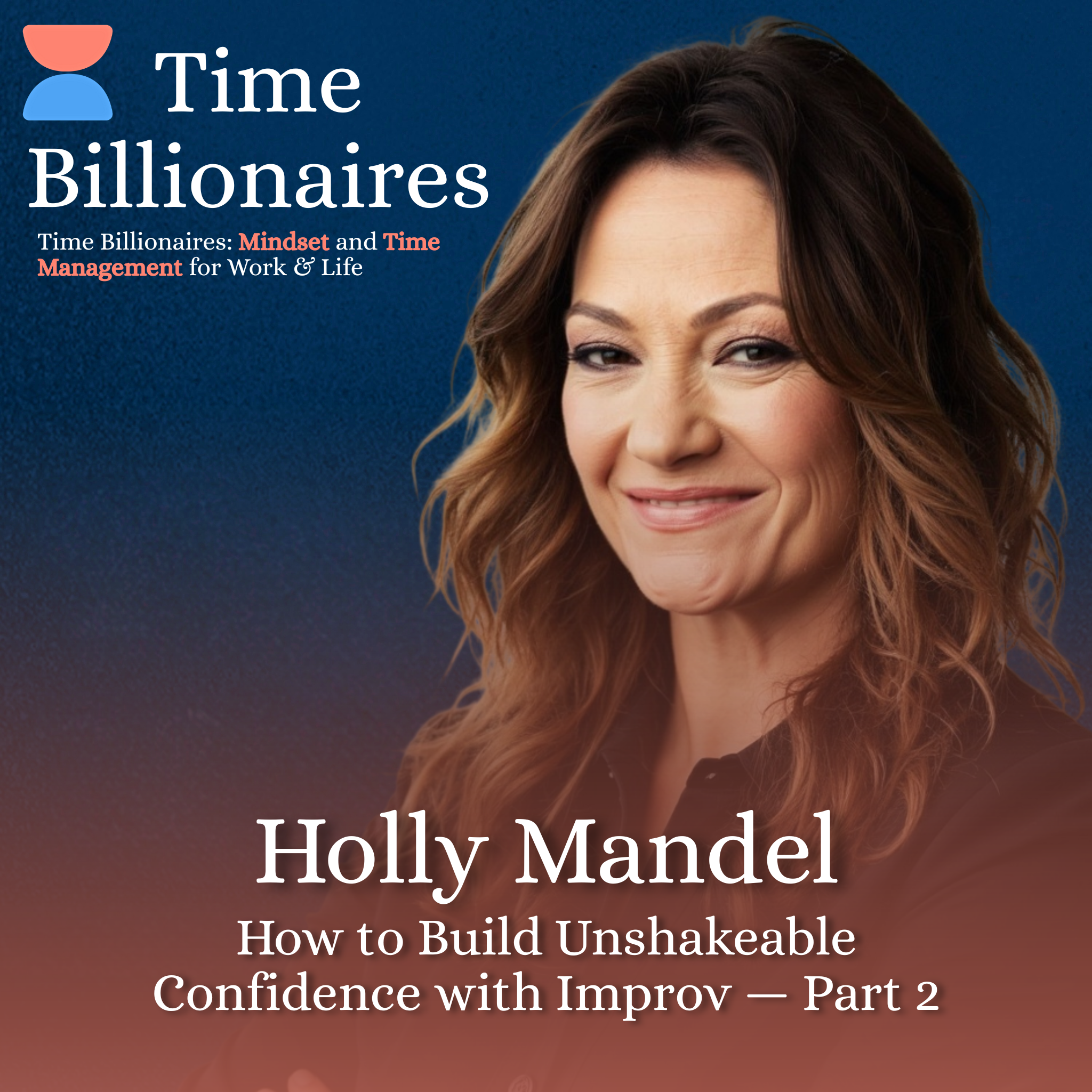Episode Transcript
[00:00:01] Speaker A: Hey there billionaire. Yep, I'm talking to you. If you expect to live another 31 years, you're already a billionaire. Not in money, but in the real.
[00:00:10] Speaker B: Measure of wealth, time.
[00:00:12] Speaker A: That's because 31 years is roughly a billion seconds. But most of us waste time in ways we'd never waste money. The currency of time billionaires is micro moments, the 90 second to 15 minute gaps hidden between the structured parts of your day. This podcast is about reclaiming them with quick, research backed ideas to help you feel more creative, productive and alive. Welcome to Time Billionaires. Let's make your next micro moment count.
[00:00:46] Speaker B: Have you ever had five minutes between meetings and thought I should do something productive and then somehow found yourself scrolling on your phone until the next meeting started?
Same the problem isn't just that this time was wasted, but that the deluge of scrolling and reading actually fatigues your brain in the same way that working in a knowledge job does.
So you're not just wasting time, you're actually draining your energy by giving your brain more to process without any added benefit.
Micro moments, those 90 second to 15 minute gaps between the structured parts of your day are often wasted not because we're lazy, but because we don't have a better menu of options.
That's where the framework behind Time Billionaires originated.
When I started digging into the science of what makes a good life, things like fulfillment, creativity, connection, and joy. I kept seeing the same patterns. Whether the research came from neuroscience, psychology, or longevity studies, the same things kept showing up again and again.
So I started collecting and sorting them.
What emerged were six categories that act like a kind of time Nutrition Just like your body needs different types of vitamins to thrive, your brain and mood need different types of inputs to feel alive and grounded.
The best part is you don't need a major life overhaul to fit them in. You can get small doses of each just from your micro moments each day.
So this episode is going to walk you through the categories of living a meaningful life and offer two quick exercises you can try from each right away.
Number one, the first category is reflection and mindset. These are the grounding micro moments, the ones that help you step off autopilot, reconnect with your values, and align with your internal narrative. This is often where mindfulness can come in. And here are two Reflection and Mindset. Micro moment activities you can try today. Number one ask yourself, if the world were ending in 30 minutes, what would I do?
When's the last time you actually did that? And what's stopping me from doing that today?
Number two Think of a problem or challenge, however big or small, that's on your mind right now. Something that's bothering you that you'd like to resolve.
Now imagine you were the protagonist in a book and faced this challenge. What would you want the protagonist to do? You can use reflection micro moments when you feel reactive or unsure of what really matters. Reject the notion that meditation requires a minimum time commitment in total silence. Being in the present can happen right now, regardless of where you are and what's going on in your life.
Number two the second category of micro moments are exercise and physical movement.
You've probably heard all the research on how exercise improves energy, problem solving, longevity and even sleep quality, so you don't need me to explain it. And you also don't need a full length workout to get the benefits of it. Here are two micro moment exercises that you can get in your day to day.
The first one I call Toe piano. With your shoes on or off, lift and lower each toe slowly like you're playing a keyboard. You'll be surprised by how much focus and energy this simple exercise can bring, and the second option doesn't take much thought at all. It's simply to do a 1 minute plank or 10 pushups or 10 jumping jacks or 10 sit ups or a 10 second wall sit for as long as you want. You can do this while your coffee is brewing or before you sit down at your desk. I like to challenge myself to see how many push ups I can do against the kitchen countertop while my coffee brews each morning and I try to beat my own record. It adds a little healthy dose of competition that shifts my mind totally to the present and I'm counting my push ups. You can use movement and exercise macro moments when you feel sluggish or stuck in your head, it's easy to think you have to forego exercise until you have time for a full workout. But bursts of movement throughout the day are beneficial and underrated.
The third category of things that we need to live a meaningful life is connection, and this includes connection to both people and animals.
The single biggest predictor of long term happiness is your social connections. In fact, the Harvard Medical School Study of Adult Development, the longest running study on adult life, found that close relationships, more than money, IQ or fame, are what keep people happy and healthy throughout their lives.
The study found that a person's health at age 80 could be largely predicted by their happiness with their personal relationships at age 50. Dr. Robert Waldinger, the study's director, said the clearest message we get from this 75 year study is good relationships keep us healthier and happier period. The more isolated someone is, the less likely he or she is to be happy. And lonely people actually see their overall health and brain function decline earlier in life too.
Even tiny brief interactions can boost oxytocin, improve a sense of belonging and community, and lower cortisol levels. You can try one of these Connection micro moments Today I call the first one Barista Banter. You can thank anyone you interact with by name and ask them how their day is going. That can be your Uber driver Doorman Barista yes, as far as your brain is concerned, this counts as a positive interpersonal connection, even if it isn't as enriching long term as an ongoing friendship. The second is to send a thinking of you text. You can send a quick text, voice, note, or even a handwritten card to somebody you care about. A single sentence is enough. If you're not sure where to start, you can scroll through your photos until you find one with someone or of something that makes you think of someone.
Just sharing it and saying I'm thinking of you and hope you're having a good day can add joy to both of your days.
You can choose a connection micro moment when you're feeling isolated or craving a sense of belonging. The fourth category is thinking and learning. A study led by the neuroscientist Min Kang used FMRI scans to show that when people learn something new, especially when it's driven by curiosity, it activates the same reward centers in the brain as food or money do. The researchers publish their findings in Psychological Science and also discover that the dopamine boost you get from learning something new doesn't just feel good, it actually helps you remember what you've learned. So even if your job isn't mentally stimulating, your micro moments can be. Here are two fun thinking and learning micro moment activities you can do anywhere.
The first one is one I like to do while waiting at the doctor's office or for a prescription at the pharmacy.
I call it Anagram Word Vision. Here's how it works. First, pick any word. The longer the better, but any word that comes to mind works. Now see how many smaller words you can make just by using the letters from that word. If you don't know where to start, you can just open a news app on your phone and see one word from a headline and go from there. So for example, let's say the word is atmosphere. From the word atmosphere, you can make a lot of words like heart, stomp, phrase, theorems, earshot, mother smother, metaphors, and even hamster. I'm sure there's tons more, but those are just the ones that I found while sitting in a waiting room. There's no wrong way to do this. Just see how many words you can come up with. You can do this one by yourself, with kids, or even as a mini competition with a friend to see who can get the most words out of the same word. This one is actually a game that my parents played with my sisters and me at restaurants when we were kids and while we waited for our food we actually just thought it was fun and didn't realize it was improving our problem solving and attentiveness. And sometimes we got so into it we didn't even want to stop when our food arrived. I like this one a lot. The second thinking and learning micro moment activity is called pattern disrupt. So just pick any routine or assumption that you kind of do on autopilot and rarely question. It can be things like how you plan your day, how you make your bed, how you reply to emails, or how you start your mornings. Then brainstorm at least three different alternative ways to do the exact same thing. This boosts creativity and flexible thinking and may give you some good ideas you want to try out. Choose a thinking and learning micro moment when you're feeling stagnant or uninspired.
The fifth category of things that we need for well being is nature and sensory awareness.
Our nervous systems evolved to be tuned into the rhythms of nature.
Authors like Richard Louv and researchers like Steven Keller and E.O. wilson have written about how deeply our mental and physical well being are tied to the outdoors. According to a report from the EPA, the average American now spends about 93% of their time indoors or in a vehicle. That's less outdoor time than prisoners and maximum security facilities who are guaranteed at least two hours per day outside, according to the US Bureau of Prisons guidelines. We're living in environments our biology never signed up for, and our nervous systems are feeling that mismatch. So reconnecting to natural stimuli like light, sound and air regulates stress and improves mood and concentration.
You can try one of these two exercises to reconnect with natural stimuli wherever you are, you'll find that they help regulate stress and improve your mood. The first one is called the One Sense Walk. Set a timer on your phone for three minutes and spend that entire time taking a walk while focusing on just one of your senses, like noticing every sound. You can choose another sense on the way back, like noticing every smell or every color, everything you can see.
The second one just involves stepping outside and looking up and feeling the sun on your face for 60 seconds. That's it. You can just let your eyes adjust the light and distance and see what you can see.
I like to choose Nature Micro moments. When I feel overstimulated or mentally fried, they're pretty quick. The sixth and final category is Play and Creativity.
The drive to play at all ages of human development is biologically hardwired into our genes and rooted in the same neural systems that govern survival behavior behaviors like sleep and hunger. Dr. Stuart Brown found that play activates brain circuits involved in memory, emotion and executive function.
Neuroscience research using FMRI scans shows that play engages the prefrontal cortex and promotes neuroplasticity, enhancing learning, emotional regulation and creative thinking.
We learn and remember things better through play and it can unlock new ideas and joy.
Play and Creativity Micro moments are quick antidotes to perfectionism and over optimization.
Here are two play and creativity exercises you can try today.
The first one is just a triangle sketch, so take out a piece of paper and set a timer for one minute. Simply draw triangles on it for the full 60 seconds. If you get bored, keep going until the timer goes off. These triangles can be the same size, different sizes and dimensions, and overlapping as much or as little as you want them to be. I like to flip them around different directions and overlap them in different ways.
This activity brings a small amount of art and drawing into your day and can spark a surprising amount of focus, appreciation for the rudimentary and varying shapes around us and sparking us to seek out other opportunities for creativity in the days that follow. I personally love this one. The second one is Musical Discovery, so think of a musical artist you've heard of but never really listened to. So just go pick out two of their songs and listen to them back to back. Don't multitask or do anything other than stand or sit quietly and listen for the full duration of those songs. You may even want to close your eyes to really take in the sounds and lyrics.
I like to choose playing Creativity Micro Moments when I'm feeling stressed or find myself ruminating or even bored.
There is no such thing as the perfect micro moment activity and you don't need to obsess about doing the ones you choose perfectly. Doing any of these exercises will offer more benefit than scrolling through emails that you don't have time to answer.
The key is that you don't need a big schedule reset or life overhaul to feel happier and more in control of your day. You just need to be intentional about reclaiming the small pockets of time that are wasted on things that don't add value to your life.
That's it. I'd love to hear what you think. Thanks for joining me for this. And I'm curious, which micro moment activity will you try out next?
[00:12:09] Speaker A: Thanks for spending this micro moment with me.
[00:12:11] Speaker B: If you found it valuable, share it.
[00:12:13] Speaker A: With a fellow time billionaire and give.
[00:12:15] Speaker B: Us a rating to help others discover.
[00:12:16] Speaker A: The power of micro moments.
For more ways to reclaim your time, check out timebillionaires. Org and follow me Rebecca Shattucks on LinkedIn. See you next time.


